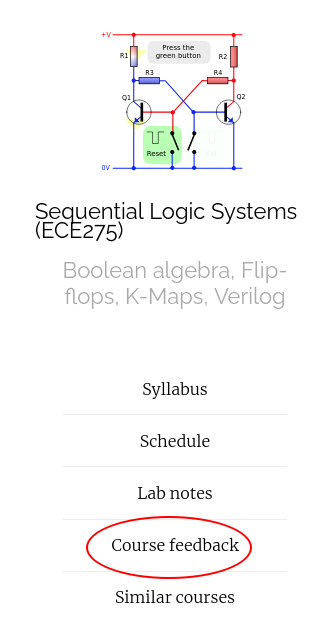ECE 275: Boolean algebra review
Basic gates
AND gate
\( L_{\text{AND}}(x_1, x_2) = x_1 \cdot x_2 \)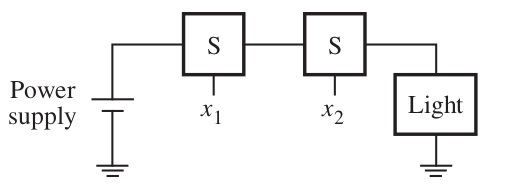
\( L_{\text{AND}}(x_1, x_2) = x_1 \cdot x_2 \)

OR gate
\( L_{\text{OR}}(x_1, x_2) = x_1 + x_2 \)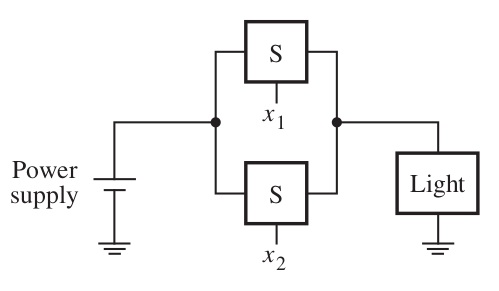
\( L_{\text{OR}}(x_1, x_2) = x_1 + x_2 \)

NOT gate
\( L_{\text{NOT}}(x_1) = \bar{x}_1 \)
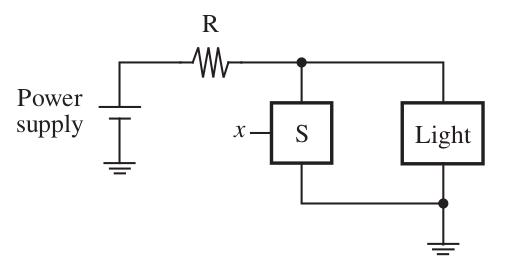
Source:Verilog 3rd, Brown and Vranesic 2014
\( L_{\text{NOT}}(x_1) = \bar{x}_1 \)

Boolean algebra
Single variable Theorems
-
\( x \cdot 0 = ? \)
\( x \cdot 0 = 0 \)
-
\( x + 1 = ? \)
\( x + 1 = 1 \)
-
\( x \cdot 1 = ? \)
\( x \cdot 1 = x \)
-
\( x + 0 = ? \)
\( x + 0 = x \)
-
\( x \cdot x = ? \)
\( x \cdot x = x \)
-
\( x + x = ? \)
\( x + x = x \)
-
\( x \cdot \bar{x} = ? \)
\( x \cdot \bar{x} = 0 \)
-
\( x + \bar{x} = ? \)
\( x + \bar{x} = 1 \)
- \(\bar{\bar{x}} = x \)
\[
\newcommand{\bx}{\bar{x}}
\newcommand{\by}{\bar{y}}
\newcommand{\bz}{\bar{z}}
\]
Sample homework problem
Use algebraic manipulation to find the minimum product of sums expression for the function
\[ f = x_1 \bx_3 \bx_4 + x_2 \bx_3 \bx_4 + x_1 \bx_2 \bx_3 \]
Soln
\begin{align}
f &= x_1 \bx_3 \bx_4 + x_2 \bx_3 \bx_4 + x_1 \bx_2 \bx_3 &
\\
&= x_1 (x_2 + \bx_2) \bx_3 \bx_4 + x_2 \bx_3 \bx_4 + x_1 \bx_2 \bx_3 & \because 1 = x_2 + \bx_2
\end{align}
| \(\bar{x}_1\) | \(x_1 \) | ||||
|---|---|---|---|---|---|
| \(\bar{x}_2\) | \(x_2 \) | \(\bar{x}_2\) | |||
| \(\bar{x}_3\) | \(\bar{x}_4\) | 0 | 1 | 1 | 1 |
| \(x_4\) | 0 | 0 | 0 | 1 | |
| \(x_3\) | 0 | 0 | 0 | 0 | |
| \(\bar{x}_4\) | 0 | 0 | 0 | 0 | |
\begin{align}
&= x_1 x_2 \bx_3 \bx_4 + x_1 \bx_2 \bx_3 \bx_4 + x_2 \bx_3 \bx_4 + x_1 \bx_2 \bx_3 & \text{ by distributive prop. }
\\
&= (x_1 + 1) x_2 \bx_3 \bx_4 + x_1 \bx_2 \bx_3 (x_4 + 1) & \text{ by distributive prop. }
\\
&= x_2 \bx_3 \bx_4 + x_1 \bx_2 \bx_3 & \text{ by absorption }
\end{align}
This is the simplest sum-of-product form.
Sample homework problems
Use algebraic manipulation to prove that
\[ x + yz = (x+y)(x+z) \]Soln
To prove: \( x + yz = (x+y)(x+z) \)
\begin{align}
\text{RHS} &= (x+y)(x+z)
\\
&= x(x+z)+ y(x+z) & \text{ by distributive prop}
\\
&= x\cdot x + x\cdot z + y \cdot x + y \cdot z & \text{ by distributive prop }
\\
&= x + xz + yx + yz & \because x \cdot x = x
\\
&= x(1 + z + y) + yz & \text{by commutative prop}
\\
&= x + yz = \text{LHS} & \text{ by absorption }
\end{align}
Design of three-way light control
Soln: three-way light control
Truth table
| Row | x | y | z | f |
|---|---|---|---|---|
| 0 | 0 | 0 | 0 | 0 |
| 1 | 0 | 0 | 1 | 1 |
| 2 | 0 | 1 | 0 | 1 |
| 3 | 0 | 1 | 1 | 0 |
| 4 | 1 | 0 | 0 | 1 |
| 5 | 1 | 0 | 1 | 0 |
| 6 | 1 | 1 | 0 | 0 |
| 7 | 1 | 1 | 1 | 1 |
\[ f = \sum m (1, 2, 4, 7)
\\= \bar{x} \bar{y} z + \bar{x} y \bar{z} + x \bar{y} \bar{z} + xyz \]
| \(\bar{x}\) | \(x \) | |||
|---|---|---|---|---|
| \(\bar{y}\) | \(y \) | \(\bar{y}\) | ||
| \(\bar{z}\) | 0 | 1 | 0 | 1 |
| \(z\) | 1 | 0 | 1 | 0 |
Design a multiplexer
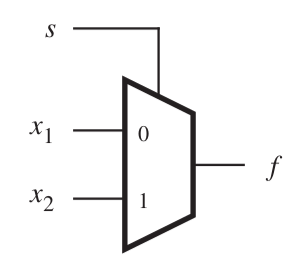
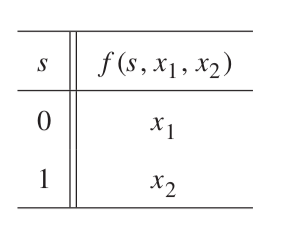
Soln: multiplexer
| Row | s | x_1 | x_2 | f |
|---|---|---|---|---|
| 0 | 0 | 0 | 0 | 0 |
| 1 | 0 | 0 | 1 | 0 |
| 2 | 0 | 1 | 0 | 1 |
| 3 | 0 | 1 | 1 | 1 |
| 4 | 1 | 0 | 0 | 0 |
| 5 | 1 | 0 | 1 | 1 |
| 6 | 1 | 1 | 0 | 0 |
| 7 | 1 | 1 | 1 | 1 |
\( f = \sum m(2, 3, 5, 7) \)
| \(\bar{s}\) | \(s \) | |||
|---|---|---|---|---|
| \(\bar{x_1}\) | \(x_1 \) | \(\bar{x_1}\) | ||
| \(\bar{x_2}\) | 0 | 1 | 0 | 0 |
| \(x_2\) | 0 | 1 | 1 | 1 |
\(f = sx_1 + \bar{s} x_2 \)
Sample homework problem
Determine whether or not the following expressions is valid
\[ \bx_1 x_3 + x_1 x_2 \bx_3 + \bx_1 x_2 + x_1 \bx_2 =
\bx_2 x_3 + x_1 \bx_3 + x_2 \bx_3 + \bx_1 x_2 x_3
\]
Prove that
If \( x + y = 1 \) and \( xy = 0 \) then \( \bx = y \)Soln: Prove that
If \( x + y = 1 \) and \( xy = 0 \) then \( \bx = y \)
\begin{align}
&x + y = 1
\\
&\implies x \bx + y \bx = \bx & \text{ multiply both sides by } \bx
\\
&\implies y \bx = \bx & \because x \bx = 0
\\
&\implies y \bx + y x = \bx + y x & \text{ add } y x \text{ to both sides }
\\
&\implies y (\bx + x) = \bx & \text{by dist. prop. and } xy = y x = 0
\\
&\implies y = \bx &
\end{align}
Prove that for two variable function
\( \overline{\sum m(0, 2)} = \sum m(1, 3) \)Review: Minterms
Truth table
| Row num | A | B | C | D | f |
|---|---|---|---|---|---|
| 0 | 0 | 0 | 0 | 0 | 0 |
| 1 | 0 | 0 | 0 | 1 | 1 |
| 2 | 0 | 0 | 1 | 0 | 0 |
| 3 | 0 | 0 | 1 | 1 | 0 |
| 4 | 0 | 1 | 0 | 0 | 0 |
| 5 | 0 | 1 | 0 | 1 | 1 |
| 6 | 0 | 1 | 1 | 0 | 0 |
| 7 | 0 | 1 | 1 | 1 | 0 |
| 8 | 1 | 0 | 0 | 0 | 0 |
| 9 | 1 | 0 | 0 | 1 | 0 |
| 10 | 1 | 0 | 1 | 0 | 0 |
| 11 | 1 | 0 | 1 | 1 | 0 |
| 12 | 1 | 1 | 0 | 0 | 0 |
| 13 | 1 | 1 | 0 | 1 | 1 |
| 14 | 1 | 1 | 1 | 0 | 0 |
| 15 | 1 | 1 | 1 | 1 | 0 |
Minterms
List of rows where function is 1
\(f = m_1 + m_5 + m_{13} \)
\(f = \sum m(1, 5, 13) \)
Review: Sum of products
Minterms
\(f = \sum m(1, 5, 13) \)
| \(m_0\) | \(\triangleq \bar{A} \bar{B} \bar{C} \bar{D} \) |
| \(m_1\) | \(\triangleq \bar{A} \bar{B} \bar{C} D \) |
| \(m_2\) | \(\triangleq \bar{A} \bar{B} C \bar{D} \) |
| \(m_3\) | \(\triangleq \bar{A} \bar{B} C D \) |
| \(m_4\) | \(\triangleq \bar{A} \bar{B} \bar{C} \bar{D} \) |
| \(m_5\) | \(\triangleq \bar{A} \bar{B} \bar{C} D \) |
| \(m_6\) | \(\triangleq \bar{A} \bar{B} C \bar{D} \) |
| \(m_7\) | \(\triangleq \bar{A} \bar{B} C D \) |
| \(m_8\) | \(\triangleq A \bar{B} \bar{C} \bar{D} \) |
| \(m_9\) | \(\triangleq A \bar{B} \bar{C} D \) |
| \(m_{10}\) | \(\triangleq A \bar{B} C \bar{D} \) |
| \(m_{11}\) | \(\triangleq A \bar{B} C D \) |
| \(m_{12}\) | \(\triangleq A B \bar{C} \bar{D} \) |
| \(m_{13}\) | \(\triangleq A B \bar{C} D \) |
| \(m_{14}\) | \(\triangleq A B C \bar{D} \) |
| \(m_{15}\) | \(\triangleq A B C D \) |
Sum of products
\(
f = \bar{A} \bar{B} \bar{C} D
+ \bar{A} \bar{B} \bar{C} D
+ A B \bar{C} D \)
Soln: Prove that for two variable function
\( \overline{\sum m(0, 2)} = \sum m(1, 3) \)
We know that \( \sum m(0, 2) + \sum m(1, 3) = 1 \)
\begin{align} \left(\sum m(0, 2) \right)& \cdot \left(\sum m(1, 3) \right)\\ &= (\bx_1 \bx_2 + x_1 \bx_2)(\bx_1 x_2 + x_1 x_2) \\ &= \bx_1 \bx_2 \bx_1 x_2 + \bx_1 \bx_2 x_1 x_2 + x_1 \bx_2 \bx_1 x_2 + x_1 \bx_2 x_1 x_2 \\ &= 0 \end{align}
We know that \( \sum m(0, 2) + \sum m(1, 3) = 1 \)
\begin{align} \left(\sum m(0, 2) \right)& \cdot \left(\sum m(1, 3) \right)\\ &= (\bx_1 \bx_2 + x_1 \bx_2)(\bx_1 x_2 + x_1 x_2) \\ &= \bx_1 \bx_2 \bx_1 x_2 + \bx_1 \bx_2 x_1 x_2 + x_1 \bx_2 \bx_1 x_2 + x_1 \bx_2 x_1 x_2 \\ &= 0 \end{align}
Prove that for three variable function
\( \sum m(0, 2, 3, 7) = \prod M(1, 4, 5, 6) \)Soln: Prove that for three variable function
\begin{align} \sum m(0, 2, 3, 7) &= m_0 + m_2 + m_3 + m_7 \\ &= \overline{ m_1 + m_4 + m_5 + m_6} \\ &= \bar{m}_1 \bar{m}_4 \bar{m}_5 \bar{m}_6 \\ &= M_1 M_4 M_5 M_6 \\ &=\prod M(1, 4, 5, 6) \end{align}Design an expression for
\(f = \sum m(0, 2, 3, 4, 5, 6, 7) \)Thanks, Questions, Feedback?
https://vikasdhiman.info/ECE275-Sequential-Logic/